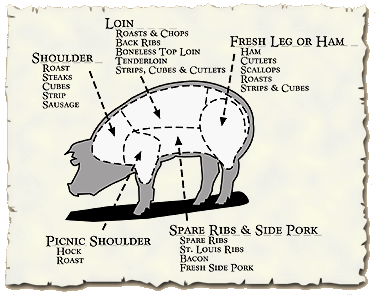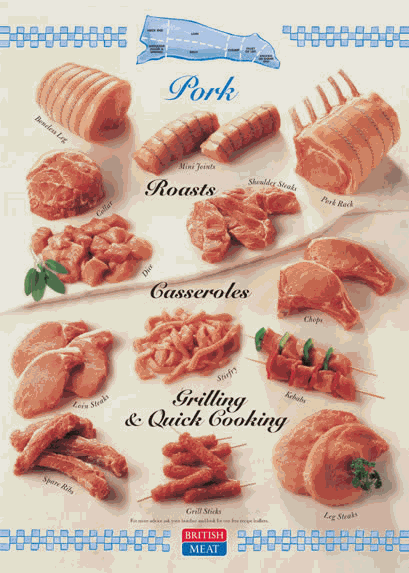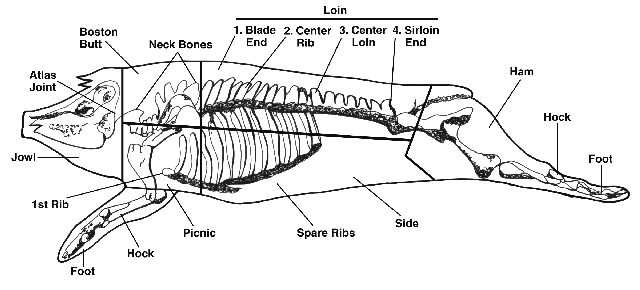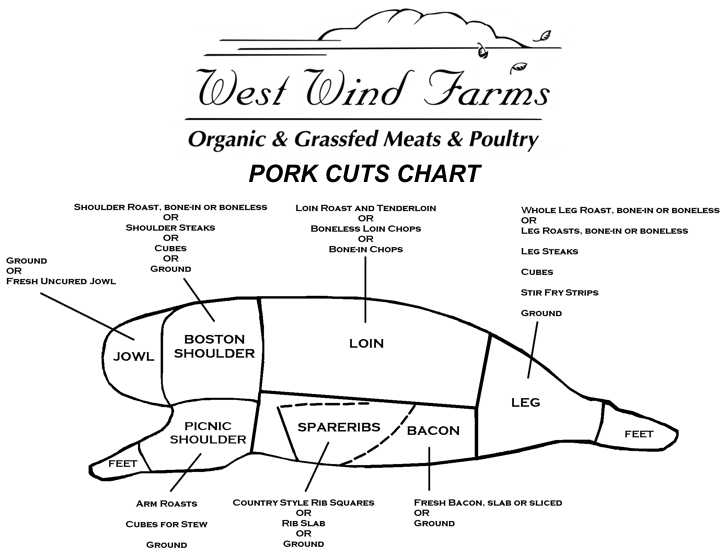
Pork Facts
Nutrition: Pork Is Vital to a Healthy Diet
Pork producers have listened to consumers' preferences and concerns. Since the 1980s, the fat content of pork has been dramatically reduced. For example, the most popular selection of pork, the tenderloin is now 42% lower in fat. This was achieved through: improved breeding and feeding practices and better trimming of fat, both at the processors and in the stores.
Today's lean pork means pork plays a vital part in a healthy diet. The key is to achieve a nutritional balance and practice moderation. Each food group (grains, vegetables & fruit, milk products, and meat & alternatives) provides part, but not all, of the daily nutrient needs. So choose foods from all four-food groups, and eat as wide a variety as possible from within each group.
When it comes to good health and good eating, pork gets top marks. Pork contains many of the nutrients recommended by many health organizations to build and maintain a healthy body, including six essential vitamins, four important minerals, protein and energy.
America's perception of pork is changing and consumers are beginning to realize that pork is a desirable lean meat choice. Pork is showing up in many dietary plans, including those of the American Heart Association, American Dietetic Association, American Diabetic Association, and other public health opinion leaders.
Pork Nutrition Facts
http://www.nppc.org/resources/nutrition.html
Nutritional Profile: Ground pork based on a 4 oz. (112 g) serving size
|
Calories |
Calories from Fat |
Total Fat |
Saturated Fat |
Cholesterol |
Sodium |
Total Carbohydrates |
Protein |
Iron |
|
260 |
170 |
19 g |
7 g |
65 mg |
60 mg |
0 g |
17 g |
|
|
% Daily Value |
29% |
35% |
22% |
3% |
0% |
4% |
http://www.ams.usda.gov/lsg/cp/pork/pork_cat.htm
Pork - A Powerhouse of Nutrition
Pork contains many essential nutrients to feed and
nourish our bodies. See how these nutrients support us.
Thiamin (Vitamin B1)
• builds & repairs nerves & muscles
•
maintains an appetite•
releases energy from carbohydratesRiboflavin
• releases energy from proteins
•
maintains the nervous system•
builds & repairs body tissues•
maintains healthy skin & eyesNiacin (Vitamin B3)
• releases energy from foods
•
maintains healthy skin•
maintains the digestive tract•
protects the nervous systemVitamin B6
• releases energy from proteins
•
helps transport amino acids•
helps form Niacin (Vitamin B3)•
aids functioning of nervous systemVitamin B12
• maintains red blood cells
•
ensures healthy nerve tissue•
helps produce genetic material•
supports cell function & metabolismPantothenic Acid
• releases energy from foods
•
forms cholesterol, hormones & hemoglobinZinc
• enhances and protects bones
•
improves resistance to infection•
helps form hormones & enzymes•
develops & maintains immune systemFat
• supplies energy
•
protects & insulates body parts•
nourishes skin•
promotes normal growth•
transports Vitamins A, D, E & K•
supplies essential fatty acidsProtein
• builds & repairs body tissues
•
regulates body processes•
forms antibodies to fight off infectionIron
• builds hemoglobin in red blood cells
•
prevents nutritional anemia•
helps with energy productionhttp://www.porkpeople.com/cgi-local/frames.cgi?f=learningcentre
Pork Cuts Charts

http://www.livinghistoryfarm.org/farminginthe20s/media/life_1302.gif

http://www.locallife.co.uk/smithsbutchers/photos/sides_pork.jpg

http://www.askthemeatman.com/hog_cuts_interactive_chart.htm

http://www.grassorganic.com/chart-pork.html
How Pork Compares To Other Meats
How does pork compare to other meats for fat, calories and cholesterol? Pork today compares favorably for fat, calories and cholesterol with many other meats and poultry. Many cuts of pork are as lean or leaner than chicken. Any cuts from the loin - like pork chops and pork roast - are leaner than skinless chicken thigh, according to U.S. Department of Agriculture data. Pork steaks or roasts from the leg ("fresh ham") are also lean choices.
Serving Sizes and Nutritional Profiles of Lean Meats
|
3-ounce cooked serving: |
Calories |
Total Fat (g) |
Saturated Fat (g) |
Cholesterol (mg) |
|
LEAN CHICKEN |
||||
|
Skinless chicken breast* |
140 |
3.1 |
0.9 |
73 |
|
Skinless chicken leg* |
162 |
7.1 |
2.0 |
80 |
|
Skinless chicken thigh* |
178 |
9.3 |
2.6 |
81 |
|
LEAN CUTS OF PORK |
||||
|
Pork Tenderloin |
139 |
4.1 |
1.4 |
67 |
|
Pork boneless sirloin chop** |
164 |
5.7 |
1.9 |
78 |
|
Pork boneless loin roast* |
165 |
6.1 |
2.2 |
66 |
|
Pork boneless top loin chop* |
173 |
6.6 |
2.3 |
68 |
|
Pork loin chop** |
171 |
6.9 |
2.5 |
73 |
|
Pork boneless sirloin roast* |
168 |
7.0 |
2.5 |
73 |
|
Pork rib chop** |
186 |
8.3 |
2.9 |
69 |
|
Pork boneless rib roast* |
182 |
8.6 |
3.0 |
70 |
|
LEAN CUTS OF BEEF |
||||
|
Beef eye of round* |
141 |
4.0 |
1.5 |
59 |
|
Beef top round*** |
169 |
4.3 |
1.5 |
76 |
|
Beef tip round* |
149 |
5.0 |
1.8 |
69 |
|
Beef top sirloin** |
162 |
8 |
2.2 |
76 |
|
Beef top loin** |
168 |
7.1 |
2.7 |
65 |
|
Beef tenderloin** |
175 |
8.1 |
3.0 |
71 |
|
FISH (*dry heat, **moist heat) |
||||
|
Cod* |
89 |
0.7 |
0.1 |
40 |
|
Flounder* |
99 |
1.3 |
0.3 |
58 |
|
Halibut* |
119 |
2.5 |
0.4 |
35 |
|
Orange Roughy* |
75 |
0.8 |
0.0 |
22 |
|
Salmon* |
175 |
11.0 |
2.1 |
54 |
|
Shrimp** |
84 |
0.9 |
0.2 |
166 |
* Roasted, ** Broiled, *** Braised
Source: U.S. Department of Agriculture Handbook 8 series
http://www.prairiefresh.com/pfkitchen/nutrition.asp
Kurobuta Pork
Pork loin that isn't cooked properly can be a recipe for cardboard-flavored disaster. But when the pork in question is the new ultra-gourmet Kurobuta pork, a breed of black hog prized for producing well-marbled cuts with more flavor than commercial breeds, the result is juicy and delicious. Because it has a layer of fat on the outside and is marbled with fat within, the meat stays incredibly moist and tender, making Kurobuta pork nearly impossible to overcook.
The pork, which comes from pure-bred Berkshire hogs, is popular with chefs because it delivers a meatier flavor than the usual pork loin. Kurobuta pork can be found at some specialty butcher shops and is available online through Lobel's, the gourmet meat supplier based in New York. The pork runs $20 and up per pound, depending on the type of cut.
Unlike commercial, or "white" pork, Kurobuta pork is visibly different in two important ways:
Comparing the weight of loins before and after cooking, American kurobuta pork has significantly less weight loss - up to 50% less - than some other varieties. Kurobuta pork offers a unique taste experience, as well. Its texture is exquisite -- supple, yet meaty. Its flavor is lush, distinctive and abundant. And the marbling yields unparalleled juiciness for pork ... the meat glistens when you cut into it.
The Legend and Lore
Legend has it that Oliver Cromwell discovered the Berkshire breed more than 300 years ago while his army was at winter's quarters in Reading in the shire of Berks, England. From that time, the Berkshire breed has been revered for its outstanding quality, texture and flavor.
During the early 1800s, the breed was refined and has remained a pure breed since. In 1875, the American Berkshire Association (ABA) became the nation's first swine registry and has maintained pedigree records ever since.
Berkshire swine were first brought to Japan as a gift from the British government in the 19th century.
Also, known as Japanese black hog, the breed has thrived in Japan as Kurobuta pork, a name that is synonymous for a unique dining experience.